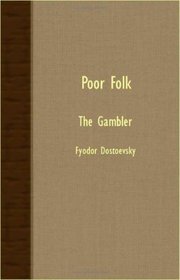Search -
POOR FOLK - THE GAMBLER (Everyman's Library)
POOR FOLK - THE GAMBLER - Everyman's Library
Author:
FICTION POOR FOLK and THE GAMBLER BY FYODOR DOSTOEVSKY -- FYODOR MIKHAILOVICH DOSTOEVSKY, born at Moscow on 30th October 182 I . Sent to penal settlement at Omsk in 1849 for revolutionary activities released in I 8 54. Resumed literary work, and died on 28th January 1881. -- THESE two examples of Dostoevskys art are sketches set in widely differ... more »
Author:
FICTION POOR FOLK and THE GAMBLER BY FYODOR DOSTOEVSKY -- FYODOR MIKHAILOVICH DOSTOEVSKY, born at Moscow on 30th October 182 I . Sent to penal settlement at Omsk in 1849 for revolutionary activities released in I 8 54. Resumed literary work, and died on 28th January 1881. -- THESE two examples of Dostoevskys art are sketches set in widely differ... more »
ISBN-13: 9781408630853
ISBN-10: 1408630850
Publication Date: 10/26/2007
Pages: 324
Rating: ?
ISBN-10: 1408630850
Publication Date: 10/26/2007
Pages: 324
Rating: ?
0 stars, based on 0 rating




